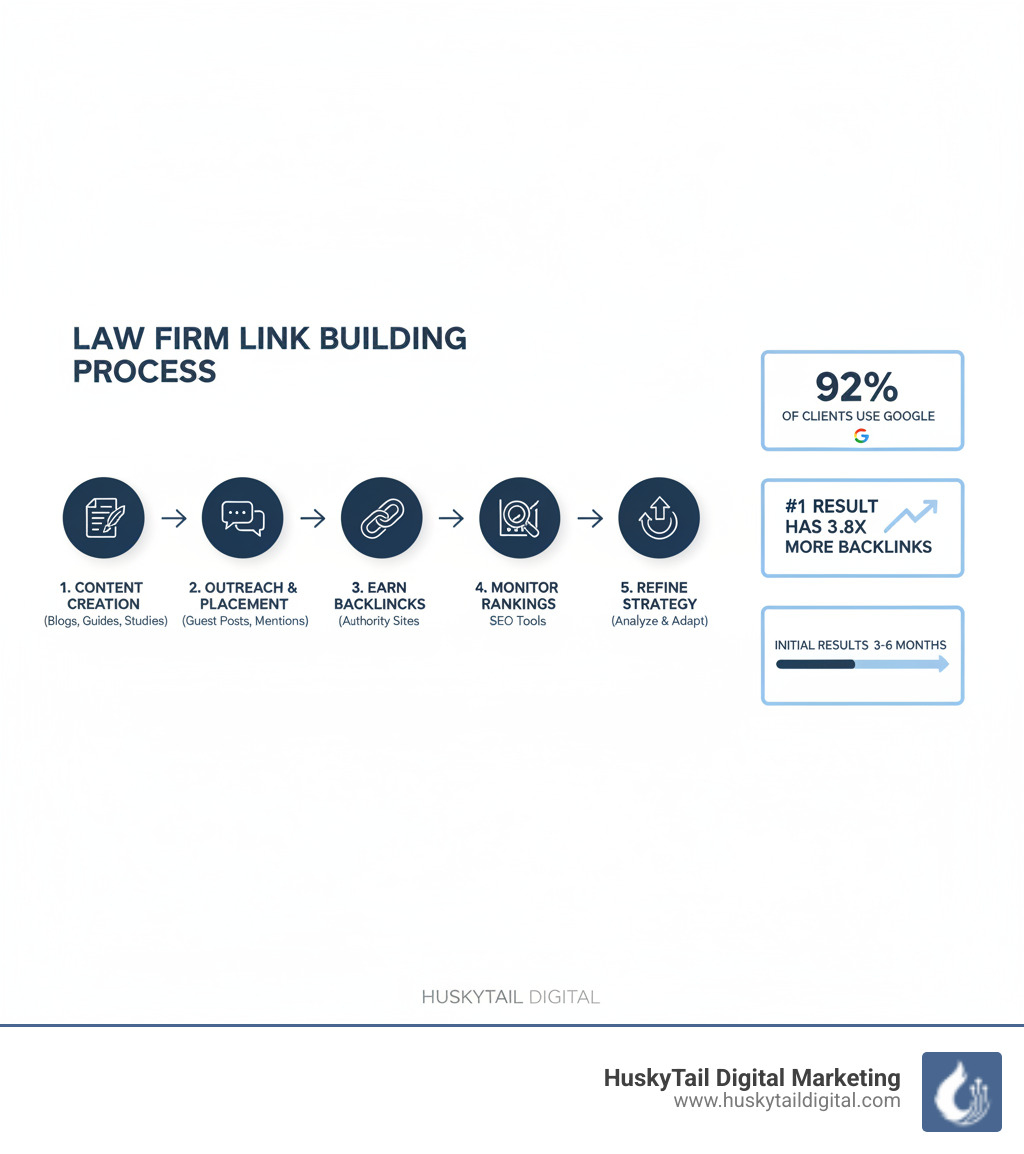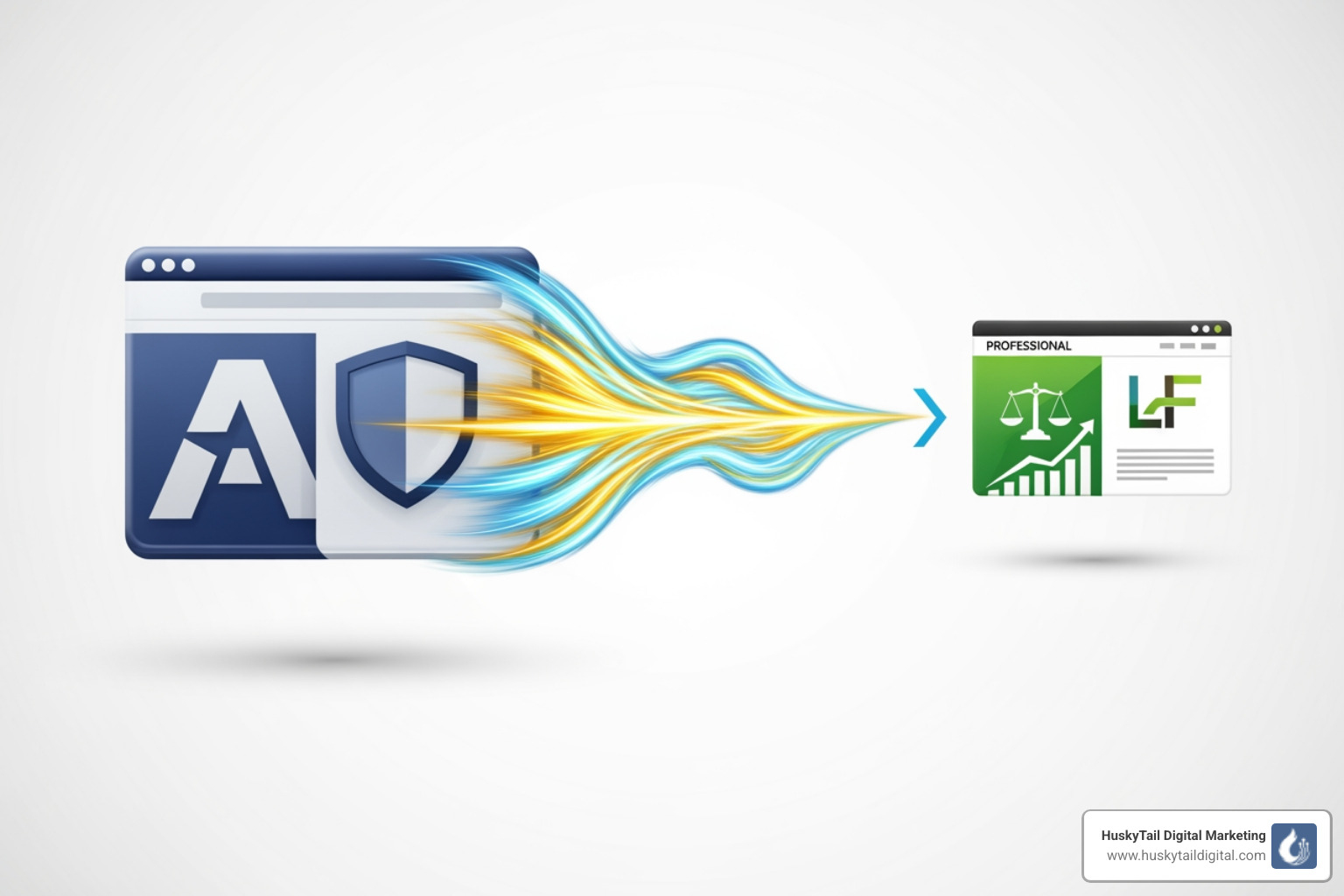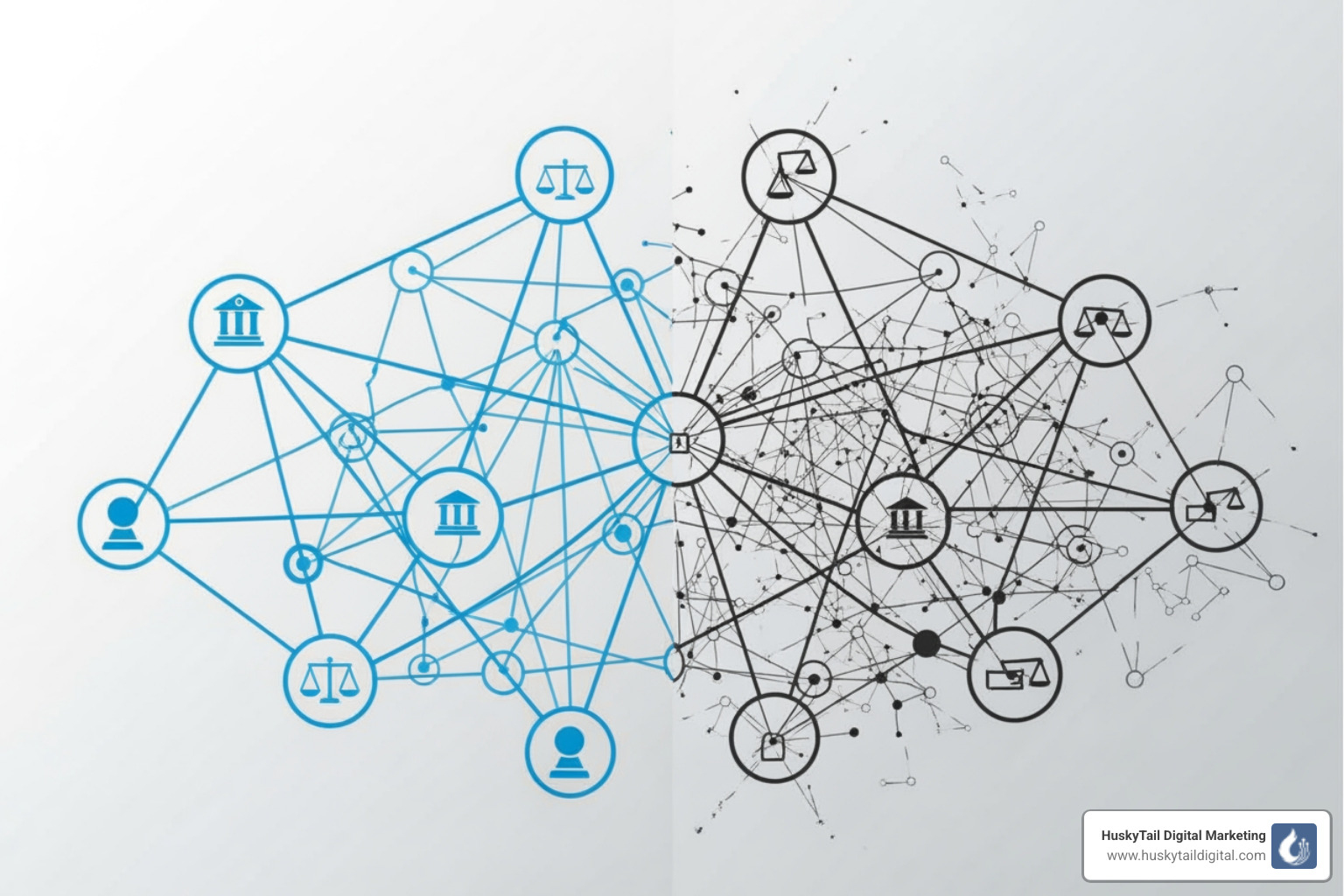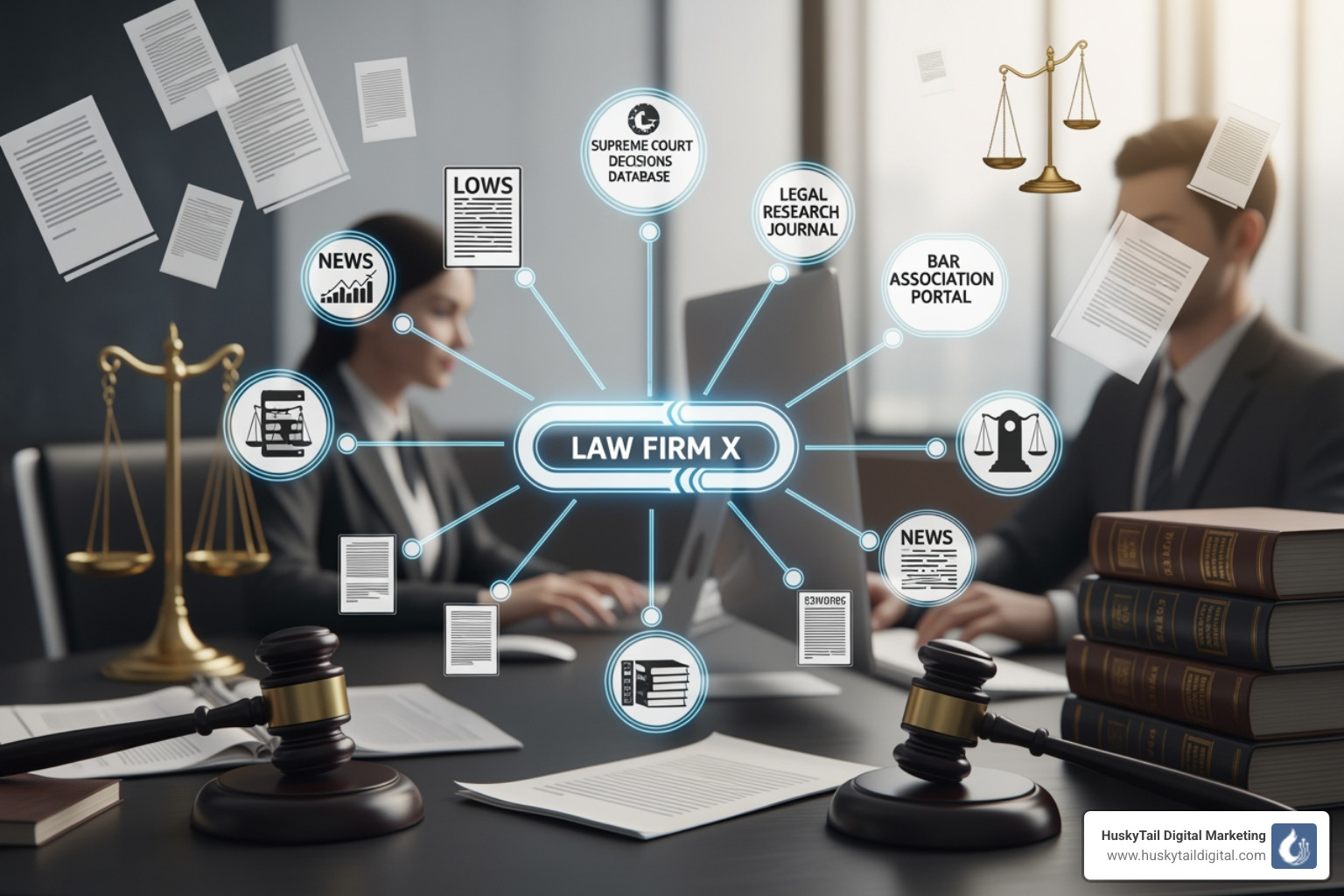Why Link Building Is The Secret Weapon Law Firms Ignore (Until They're Invisible)
Link building for lawyers is the process of earning hyperlinks from other websites to your law firm's site. It's one of the most powerful ways to improve search rankings, establish credibility, and attract high-value clients.
Quick Answer: What You Need to Know About Link Building for Lawyers
- What it is: Earning backlinks from authoritative websites to your law firm's site
- Why it matters: 92% of potential clients turn to Google for legal help, and backlinks are a top-3 Google ranking factor
- Key strategies: Create valuable content, guest blog on legal publications, leverage media opportunities, claim directory listings, and build local partnerships
- Results timeline: Initial improvements in 3-6 months; significant impact in 6-12 months
- Quality over quantity: One link from a respected legal publication outweighs dozens from low-quality sites
Here's the reality: most law firms are invisible online.
They have strong credentials and beautiful websites, but when a potential client searches for "divorce attorney near me," they're nowhere to be found. The firms that do show up aren't necessarily better lawyers—they just understand that backlinks are currency in Google's economy.
Think of backlinks as digital professional referrals. When a respected legal publication or local news outlet links to your website, they're vouching for your expertise. Google sees these "votes of confidence" and rewards you with higher rankings. The data is clear: the #1 result in Google has, on average, 3.8 times more backlinks than positions #2 through #10.
Yet many attorneys ignore link building, thinking it's too technical or time-consuming. Some even buy links, a risky tactic with severe penalties.
The good news is that ethical link building is about creating value and building relationships. It's about positioning your firm as an authority, whether you practice personal injury, family, or corporate law.
I'm Stephen Gardner, founder of HuskyTail Digital Marketing. For over 20 years, I've helped law firms build authority with strategic, AI-improved link building that drives real results. This guide will show you how to build a backlink profile that dominates search and brings qualified clients to your door.

Why Backlinks Are A Non-Negotiable For Law Firm SEO
Here's something most attorneys don't realize: your law firm could have the most brilliant legal mind and the most compelling case results, but if Google doesn't trust you, none of it matters.
That's where link building for lawyers enters the picture.
Think of backlinks as peer recommendations. When another respected website links to your firm, they're telling Google, "This firm knows their stuff. You can trust them." These digital endorsements are votes of confidence, and backlinks remain one of Google's most influential ranking signals.
With 92% of potential clients turning to Google for legal help, visibility is everything. The competition is brutal: the #1 result in Google has, on average, 3.8 times more backlinks than the rest of the top 10.
Backlinks also play a critical role in Google's E-E-A-T framework (Experience, Expertise, Authoritativeness, Trustworthiness). Links from reputable sources vouch for your expertise, building trust that Google rewards with better visibility and that clients reward with their business. Beyond rankings, quality backlinks drive valuable referral traffic from people already interested in legal services.
Understanding Domain Authority and Link Equity
Two key terms in link building are Domain Authority and Link Equity.
Domain Authority (DA) is a score created by Moz from 1-100 that predicts a website's ranking potential. While not a Google metric, it's the industry standard for assessing a site's strength. Page Authority (PA) applies the same concept to individual pages.
Link Equity, or "link juice," is the value passed from one site to another through a hyperlink. When a high-authority site links to you, it passes along a portion of its authority, boosting your own. This is why earning links from trusted sources is so valuable—you're getting a transfer of credibility that tells Google your firm deserves to rank higher.

Quality vs. Quantity: What Matters for Attorneys
Many firms mistakenly chase link quantity over quality. One backlink from the American Bar Association is worth more than 100 links from random, irrelevant websites. Google evaluates the credibility of each source, not just the total number.
High-quality backlinks are relevant (from legal blogs, bar associations, or news articles in your practice area), come from authoritative sites (strong Domain Authority), and are trustworthy (reputable and spam-free). The link's placement should feel natural within the content, and the anchor text (the clickable words) should be descriptive.
A natural, diverse link profile—from directories, news sites, blogs, and local organizations—looks organic and earned. A profile with hundreds of identical, low-quality links looks manipulative and risks a penalty.

The bottom line? Focus on earning links you'd be proud to show a potential client. If a backlink source would make you cringe in a professional setting, it's probably not helping your SEO either.
10 Ethical & Effective Link Building Strategies For Lawyers
Here's how to do link building the right way. At HuskyTail Digital Marketing, we practice white-hat SEO: no shortcuts, no shady tactics, just genuine value and real relationships. It takes more time, but it builds a foundation that lasts. For more on our methods, see our Link Building services.
Think of it like building a legal case: you need solid evidence and a strategy that holds up. Here are ten proven strategies for law firms.

1. Create High-Value "Linkable Assets"
The best way to earn backlinks is to create content so valuable people want to link to it. Law firms with active blogs earn 97% more backlinks, and longer content attracts more links.
What works?
- In-depth guides: Comprehensive resources like "The Complete Guide to Estate Planning in California" become go-to references.
- Original research and statistics: Conduct surveys or analyze public data. Journalists need credible stats, and if you're the source, you get the link.
- Infographics: Visually translate complex legal topics. A well-designed infographic explaining the steps in a personal injury claim is highly shareable.
- Detailed FAQ pages: Thoroughly answering common legal questions can make your page the definitive resource that others cite.
Consistency is key. Starting a blog and publishing quality content regularly turns your site into an authority that naturally attracts links.
2. Guest Blogging on Authoritative Legal Publications
Guest blogging puts your expertise in front of new audiences while earning authoritative backlinks. Publications like Law Technology Today and Attorney at Work seek contributions from practicing attorneys, giving you a byline with a link back to your firm.
Target publications that align with your practice area. If you're a Personal Injury Attorney, write for personal injury news sites. If you specialize in Family and Divorce Law, target family law journals.
When pitching, negotiate for contextual links within the body of your article, as these pass more value than a simple bio link.
3. Leverage Media Opportunities for Legal Experts
Journalists need expert opinions, and you need high-authority backlinks from news sites. Platforms like Help a Reporter Out (HARO), ResponseSource, and Qwoted connect reporters with expert sources. Sign up, and you'll get daily queries. Respond quickly and concisely to a journalist's request, and if your quote is used, you'll typically earn a backlink.
Also, target local media. Your firm's newsworthy activities—a significant case win, a free legal clinic, or a community sponsorship—make great local news. Send press releases to local newspapers and TV stations. The Local Media Association can help you find contacts.

4. Build a Presence in Legal & Business Directories
Directory listings are foundational for lawyer link building. They provide backlinks and trust signals that verify your firm's legitimacy.
Start with major legal directories like Justia, Avvo, FindLaw, and the American Bar Association directory. Also, claim your state bar association directory profile.
Then, claim profiles on general business platforms like Google Business Profile, Yelp, and Facebook. The critical detail: ensure your Name, Address, and Phone Number (NAP) are identical across every platform to avoid confusing search engines.
5. Reclaim Unlinked Brand Mentions
Websites sometimes mention your firm or attorneys without linking to you. These are easy backlink opportunities. Use tools like Google Alerts or Brand24 to find these mentions.
When you find one, send a polite email to the author or webmaster. Since they've already referenced you, they're often happy to add a link. A brief, friendly message is all it takes: "Hi [Name], thanks for mentioning our firm in your article on [topic]. Would you consider adding a link to our site so your readers can learn more?"
6. Offer Scholarships and Community Sponsorships
Giving back to the community can earn high-authority .edu and .org backlinks. Offer a scholarship to law students and promote it. Universities and scholarship sites will list your program with a link back to your website. The Shook and Stone law firm scholarship is a great example of this strategy's success.
Sponsoring local events, charities, or non-profits also works well. They typically feature your firm's logo and a link on their website, providing an authoritative backlink and demonstrating community commitment.
7. Engage in Local SEO Link Building
Since legal services are local, building locally relevant backlinks is crucial for ranking in "near me" searches. We've helped firms dominate local search in cities from Atlanta to San Francisco with this approach.
- Partner with complementary local businesses (e.g., a real estate attorney with real estate agents).
- Join your local Chamber of Commerce for a directory link.
- Host or sponsor community events like free legal clinics to generate local media coverage.
- Create content specific to local laws to attract links from local resources.
For more on this, visit our Local SEO page.
8. Participate in Legal Forums and Q&A Sites
Platforms like Reddit (e.g., r/legaladvice) and Quora let you showcase expertise. The goal is brand awareness and referral traffic more than direct link equity.
Provide genuine value first. Answer questions thoroughly without a hard sales pitch. Only include a link to your site if it points to a relevant, in-depth resource that adds value. While many forum links are "no-follow" (they don't pass authority), they still drive traffic and build your firm's reputation.
9. Analyze Competitor Backlinks
Reverse-engineer the success of your top-ranking competitors. Use tools like Ahrefs or Semrush to see who links to them.
Ahrefs' Site Explorer shows a competitor's entire backlink profile, while Semrush's Backlink Gap Tool compares your profile to theirs, revealing opportunities you're missing. When you see that your top competitors all have a link from the same directory or publication, that's your roadmap. Reach out to those same sources.
10. Leverage Testimonials and Reviews
Testimonials build credibility and create backlink opportunities. If your firm uses specific legal software or works with other professionals (like forensic accountants), offer to provide a testimonial for their website. They get social proof, and you get a relevant backlink.
Encourage satisfied clients to leave reviews on platforms like Google Business Profile, Avvo, and Yelp. While these links may not pass significant equity, they act as powerful local citations that boost your visibility and credibility.
The Modern Lawyer's Toolkit: AI, Measurement, And Risk Management
Successful link building for lawyers today requires integrating technology, measuring results, and managing risks. At HuskyTail Digital Marketing, we use AI-powered SEO strategies to ensure every link contributes to your firm's growth.

Using AI in Law Firm Link Building
AI is revolutionizing SEO. We use it not to replace human judgment but to make our strategies more efficient.
AI can assist with:
- Research and Outreach: Quickly identify high-authority websites and help craft personalized outreach emails.
- Content Ideation: Generate content ideas based on trends and competitor analysis.
- Personalization: Tailor messages to increase successful link acquisition.
However, AI must be used ethically. Relying on AI-generated guest posts or spammy tactics can lead to penalties. We treat AI as a tool to assist, not replace, human strategy, keeping our approach compliant with Google’s guidelines. We carefully weigh the pros and cons of using AI to ensure effectiveness. Learn more about our AI SEO services.
Measuring Success and Tracking ROI
Link building is an investment that must be measured. We track Key Performance Indicators (KPIs) to monitor growth:
- Referring Domains: The number of unique websites linking to you.
- Referral Traffic: Visitors coming directly from backlinks.
- Organic Ranking Improvements: Tracking keyword rankings for your target practice areas.
- Organic Search Traffic: Overall traffic from search engines.
- New Client Inquiries: The ultimate goal.
We use tools like Google Analytics to monitor these metrics and refine our strategies for optimal ROI.
Avoiding Black Hat SEO and Google Penalties
Ethical considerations are paramount. "Black hat" SEO tactics violate Google’s guidelines and can severely damage your firm's reputation and rankings.
Avoid these common pitfalls:
- Buying Links: A clear violation that Google is adept at detecting.
- Link Schemes: Excessive link exchanges or large-scale guest posting with keyword-stuffed anchor text.
- Private Blog Networks (PBNs): Networks of sites created solely to link to your main site.
- Irrelevant Links: Acquiring links from sites unrelated to the legal industry.
Our approach prioritizes transparency and quality to ensure your firm's long-term SEO health.
The Importance of Disavowing Bad Links
Your site may accumulate "toxic backlinks" from spammy or irrelevant sites, either naturally or from competitor attacks. These can harm your SEO.
If you identify harmful links that you can't get removed manually, Google's disavow tool lets you tell Google to ignore them. It's a powerful tool that should be used with caution, as disavowing good links can hurt your rankings. Regular backlink monitoring and proactive disavowing are crucial for protecting your SEO integrity.
Frequently Asked Questions About Link Building For Lawyers
Let's address common questions law firms have about link building for lawyers to help set realistic expectations.
How long does it take to see results from link building?
Link building is a marathon, not a sprint. Be wary of anyone promising overnight results.
Typically, you'll see initial improvements in rankings and traffic within 3 to 6 months. Significant, sustainable impact that transforms your online visibility usually takes 6 to 12 months or longer. The timeline depends on your practice area's competitiveness, the intensity of your strategy, and your website's current authority.
Patience and consistency are key; the results compound over time.
What is the difference between a do-follow and a no-follow link?
Do-follow links are standard hyperlinks that pass "link equity" or authority to your site. These are seen as endorsements by search engines and directly boost your SEO. They are the primary goal of link building.
No-follow links contain a piece of code (rel="nofollow") telling search engines not to pass authority. However, they are not worthless. No-follow links still drive valuable referral traffic, increase brand awareness, and contribute to a natural-looking backlink profile. High-authority sites like major news outlets often use them by default.
A healthy profile includes both.
Should my law firm buy backlinks?
In a word: no. Buying backlinks is a direct violation of Google's guidelines and is considered a 'black hat' tactic. It's like paying for forged testimonials—the risk is not worth the reward.
Google's algorithms are sophisticated at detecting paid link schemes. The penalties are severe, ranging from plummeting rankings to complete removal from search results, which can take years to recover from. It's also an expensive gamble, with the average cost of a purchased backlink being around $361.
Instead, invest your budget in earning links organically through the ethical, value-driven strategies outlined in this guide. It's a sustainable approach that builds your firm's reputation instead of putting it at risk.
Conclusion: Build Your Authority, Grow Your Firm
Link building for lawyers is not an optional marketing tactic. It's the foundation for how your firm gets found online, establishes credibility, and attracts clients.
Every high-quality backlink is a digital professional referral, telling Google and potential clients that your firm is trustworthy and authoritative. This makes link building a vital part of any effective Attorney Lead Generation strategy.
Building a strong backlink profile takes time and a commitment to creating genuine value. But the payoff is substantial. Appearing at the top of search results for your key practice areas translates directly into consultations and growth. The strategies we've covered are about positioning your firm as a respected authority in your field.
At HuskyTail Digital Marketing, our AI-powered approach combines technology with human expertise to ensure every backlink contributes to measurable growth. We also believe in doing good, which is why our Hearts for Huskies program gives back to the community with every client we serve.
Your firm deserves to be found. Don't let potential clients find your competitors first. Contact our legal marketing experts today and let's build a strategy that puts your firm at the top.
-p-1080.webp)


.avif)









.webp)
.avif)
.avif)

